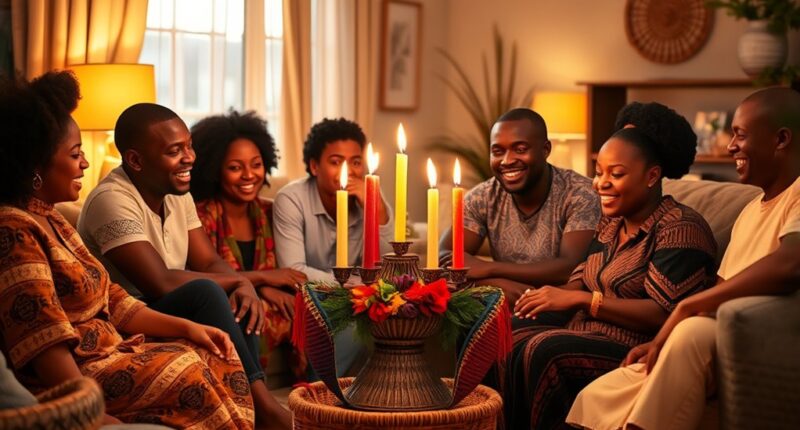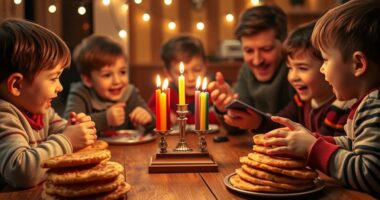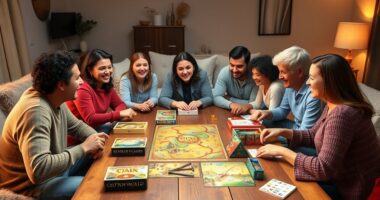Celebrating Kwanzaa at home offers a meaningful way to explore its seven principles with your family. You can set up a display with the kinara and symbols that represent unity, self-determination, and collective work. Lighting candles each night and sharing stories or traditional foods reinforce these values. By creating a personal space for reflection and learning, you’ll deepen your understanding of African heritage. Keep exploring to discover simple ways to make this celebration impactful for your family.
Key Takeaways
- Engage your family in nightly candle lighting to reflect on each of the seven principles collectively.
- Use visual symbols like the kinara and mkeka to deepen understanding of each principle’s meaning.
- Incorporate storytelling, songs, or cultural activities that highlight the values of unity, self-determination, and collective work.
- Involve children in learning about the principles through crafts, discussions, and family traditions.
- Create a home environment that celebrates African heritage, fostering pride and shared cultural identity all week long.

Celebrating Kwanzaa at home offers a meaningful way to honor African heritage and values without leaving your living space. It’s a time to reflect on the rich traditions and principles that have shaped generations, and doing so in your own environment makes the experience personal and impactful. The core of Kwanzaa revolves around its cultural significance, which emphasizes community, family, and shared history. By observing the celebration customs at home, you create a space where these values come alive, fostering a deeper understanding of African roots and the importance of unity. Setting up a Kwanzaa display with the kinara, mkeka (mat), and symbols like crops and unity cups helps you connect visually with the principles you’re embracing, making the celebration more meaningful.
Celebrating Kwanzaa at home honors heritage, community, and shared values in a personal, meaningful way.
The celebration customs during Kwanzaa are designed to reinforce the principles—Nguzo Saba—which include unity, self-determination, collective work, purpose, creativity, and faith. When you light the candles on the kinara each night, you’re not just performing a ritual; you’re actively engaging with these values. This act becomes a daily reminder of the importance of coming together as a community, supporting one another, and honoring your shared history. You might also incorporate storytelling, music, or traditional foods into your observance, blending cultural practices with personal reflection. These customs can be adapted to your home environment, making them accessible and meaningful, regardless of your living situation. Incorporating cultural symbols and practices can deepen the connection to your heritage and make the celebration more authentic.
Celebrating Kwanzaa at home allows you to tailor the experience to your family’s interests and traditions, making it more than just a holiday but a reaffirmation of cultural identity. You can involve children by teaching them about the significance of each principle and encouraging them to participate in activities that promote community and family bonds. Sharing stories about ancestors or African history nurtures a sense of pride and continuity. As you gather around the kinara and observe the candle lighting each night, you deepen your understanding of the core values that unite people of African descent globally.
Ultimately, celebrating Kwanzaa at home provides a powerful opportunity to connect with your heritage from the comfort of your living space. It’s about more than just observing customs; it’s about embodying the principles that strengthen community, foster self-awareness, and celebrate cultural identity. By making these traditions your own, you keep the spirit of Kwanzaa alive, ensuring that its message resonates within your family and community long after the holiday ends. Recognizing the cultural significance of these traditions helps reinforce their importance and impact.
Frequently Asked Questions
How Can Children Actively Participate in Kwanzaa Celebrations?
You can encourage children to actively participate in Kwanzaa celebrations by involving them in interactive crafts that symbolize the principles, like making kinara decorations or Unity Mosaics. Additionally, engage them in storytelling activities about the history and significance of Kwanzaa, fostering understanding and connection. These hands-on experiences make the celebration meaningful, fun, and educational, helping children better appreciate the principles and cultural heritage behind Kwanzaa.
Are There Specific Recipes Associated With Kwanzaa?
Yes, there are traditional foods and cultural dishes associated with Kwanzaa. You can prepare dishes like jambalaya, collard greens, and sweet potato pie to celebrate the holiday. These recipes honor African heritage and bring family together around the table. Incorporate these cultural dishes into your celebration to deepen your understanding of Kwanzaa’s principles and create meaningful connections through food and tradition.
What Are Some Affordable Ways to Create a Kwanzaa Kinara?
Imagine building a lighthouse to guide your family’s celebration—your Kwanzaa kinara. You can craft a budget-friendly lighthouse using simple DIY decorations like painted jars or recycled candle holders. Fill them with affordable candles, such as tea lights or small votives, to symbolize the seven principles. This creative approach not only saves money but also transforms everyday items into a meaningful centerpiece, illuminating your holiday with purpose and unity.
Can Kwanzaa Be Celebrated Alongside Other Holidays?
Yes, you can celebrate Kwanzaa alongside other holidays, fostering interfaith holidays and cultural integration. You might blend traditions by incorporating symbols from different celebrations or sharing stories that highlight diverse cultural values. This approach helps you honor your heritage while respecting others’, creating a meaningful, inclusive experience. Celebrating multiple holidays together encourages understanding and unity, enriching your cultural awareness and strengthening community bonds during this festive season.
How Do I Incorporate Kwanzaa Principles Into Daily Life?
You can incorporate Kwanzaa principles into your daily life by practicing daily reflection on each principle, like Umoja or Kujichagulia, to stay mindful of their meanings. Engage in community service regularly, embodying the spirit of Ujima and Ujamaa. Small acts, like supporting local businesses or helping neighbors, reinforce these values and make them a natural part of your everyday routine.
Conclusion
Celebrating Kwanzaa at home offers a meaningful way to connect with your roots and community. Did you know that over 3 million people in the U.S. observe Kwanzaa each year? By embracing the seven principles together, you strengthen bonds and promote cultural awareness. It’s a powerful reminder that honoring traditions can inspire positive change in your life and those around you. So, continue exploring, learning, and celebrating—your journey creates a lasting legacy.









